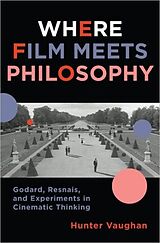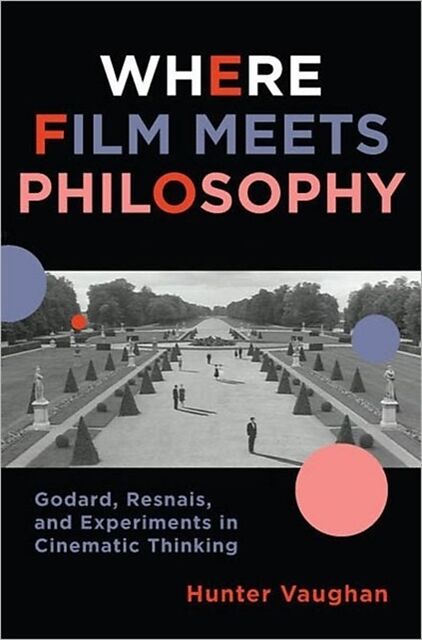Where Film Meets Philosophy
Einband:
Fester Einband
EAN:
9780231161329
Untertitel:
Godard, Resnais, and Experiments in Cinematic Thinking
Genre:
Philosophie
Autor:
Hunter Vaughan
Herausgeber:
Columbia University Press
Anzahl Seiten:
264
Erscheinungsdatum:
05.02.2013
ISBN:
978-0-231-16132-9
Informationen zum Autor Hunter Vaughan is assistant professor of English and cinema studies at Oakland University. His scholarly interests include the moving image! philosophy! and the environment. Klappentext Closely reading the films of Jean-Luc Godard and Alain Resnais! Hunter Vaughan explores the phenomenology of the moving image and its challenge to conventional modes of thought. Zusammenfassung The formal techniques two classic French filmmakers developed to explore cinemaâ™s philosophical potential. Inhaltsverzeichnis List of IllustrationsAcknowledgmentsIntroduction: Where Film Meets Philosophy1. Phenomenology and the Viewing Subject2. Film Connotation and the Signified Subject3. Sound! Image! and the Order of Meaning4. Alain Resnais and the Code of Subjectivity5. Jean-Luc Godard and the Code of ObjectivityConclusion: Where Film and Philosophy May LeadNotesBibliographyIndex
Autorentext
Hunter Vaughan is assistant professor of English and Cinema Studies at Oakland University. His scholarly interests include the moving image, philosophy, and the environment. He has a basset hound named Opie.
Klappentext
Closely reading the films of Jean-Luc Godard and Alain Resnais, Hunter Vaughan establishes a connection between phenomenology and image-philosophy to analyze the moving image and its challenge to conventional modes of thought. Striving to establish a clear foundation for the recent field of inquiry called "film-philosophy," he devises a systematic theory of film's philosophical function and its deconstruction of classic oppositional concepts, such as subject and object, real and imaginary, and interior and exterior. After merging Maurice Merleau-Ponty's theory of subject-object relations with Gilles Deleuze's image-philosophy, Vaughan applies this rich framework to a comparative analysis of Godard and Resnais. Godard's work critiques the audio-visual illusion of empirical observation (objectivity), while Resnais's innovative play with the sound-image generates new, thrilling portrayals of individual experience (subjectivity). Both radically deconstruct classical film codes, upending conventional notions of subjectivity and, by reorganizing formal elements, reconfigure subject-object relations to alter our understanding of ourselves and the world. Films discussed include Godard's Vivre sa vie (1962), Contempt (1963), and his lesser-critiqued 2 or 3 Things I Know About Her (1967); Resnais's Hiroshima, mon amour (1959), Last year at Marienbad (1961) and his critically overlooked masterpiece, The War is Over (1966). Situating the formative works of these filmmakers within a broader philosophical context, Vaughan pioneers a phenomenological film semiotics that reconciles two disparate methodologies and joins them to the achievements of two seemingly oppositional artists.
Zusammenfassung
The formal techniques two classic French filmmakers developed to explore cinemaâ™s philosophical potential.
Inhalt
List of IllustrationsAcknowledgmentsIntroduction: Where Film Meets Philosophy1. Phenomenology and the Viewing Subject2. Film Connotation and the Signified Subject3. Sound, Image, and the Order of Meaning4. Alain Resnais and the Code of Subjectivity5. Jean-Luc Godard and the Code of ObjectivityConclusion: Where Film and Philosophy May LeadNotesBibliographyIndex

Leider konnten wir für diesen Artikel keine Preise ermitteln ...
billigbuch.ch sucht jetzt für Sie die besten Angebote ...
Die aktuellen Verkaufspreise von 6 Onlineshops werden in Realtime abgefragt.
Sie können das gewünschte Produkt anschliessend direkt beim Anbieter Ihrer Wahl bestellen.
Loading...
Die aktuellen Verkaufspreise von 6 Onlineshops werden in Realtime abgefragt.
Sie können das gewünschte Produkt anschliessend direkt beim Anbieter Ihrer Wahl bestellen.
| # | Onlineshop | Preis CHF | Versand CHF | Total CHF | ||
|---|---|---|---|---|---|---|
| 1 | Seller | 0.00 | 0.00 | 0.00 |
